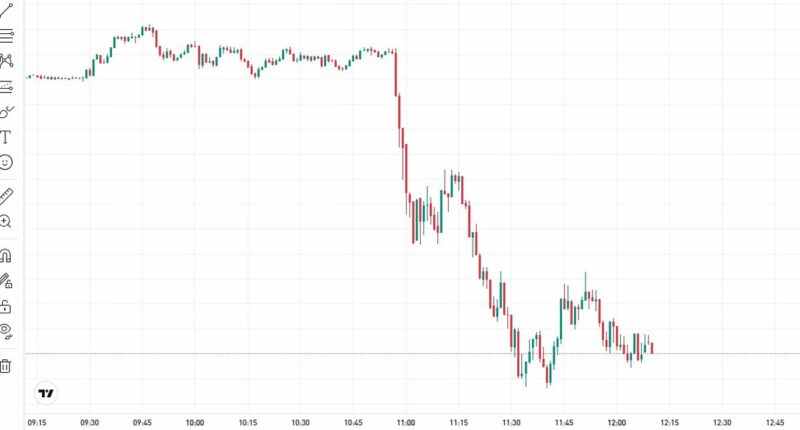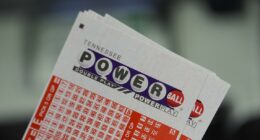Share this @internewscast.com
President Donald Trump sent global markets into turmoil on Friday by declaring plans for a 100 percent tariff on Chinese imports—a startling intensification of his trade war that experts warn could instigate the most severe market crash since 1929.
The S&P 500 dropped 2.7 percent, the Dow Jones Industrial Average decreased by 878 points, and the NASDAQ Composite fell 3.6 percent by the end of trading in New York—the steepest single-day decline since 2022.
Economists likened the panic to the onset of the 1929 Wall Street crash, cautioning that the combination of rising tariffs, inflation concerns, and escalating U.S. – China tensions could forge a perfect storm for global markets.
The market downturn began early on Friday after Trump shared an extensive post on Truth Social unveiling a ‘massive increase of tariffs on Chinese products’ aimed at ‘financially countering’ Beijing’s recent export restrictions on rare earth minerals—essential components in AI, defense, and green technologies.
‘Some very strange things are happening in China,’ Trump wrote, calling Beijing ‘very hostile.’
‘I will be forced, as President of the United States, to financially counter their move,’ he continued.
‘One of the policies we are calculating at this moment is a massive increase of tariffs on Chinese products coming into the United States.’

The S&P 500 plunged on news of China’s new rules and Trump’s immediate threat of retaliation. It was down 1.5 percent just after noon on Friday

Donald Trump, left, shakes hands with China’s President Xi Jinping during a meeting on the sidelines of the G-20 summit in Osaka, Japan, June 29, 2019

Workers use machinery to dig at a rare earth mine in Ganxian county in central China’s Jiangxi province. China is the global leader in the rare earth supply chain, and the US is heavily reliant on imports.
Hours later, the President confirmed the new 100 percent tariff, ‘over and above any tariff that they are currently paying,’ along with sweeping export controls on ‘any and all critical software.’
Both measures are due to take effect November 1 – or earlier if Beijing retaliates.
China, which controls about 70 percent of global rare earth production and 90 percent of processing, has tightened restrictions on the minerals and related technologies.
The new rules, beginning December 1, will require foreign companies to obtain special approval to export any items containing Chinese-sourced materials, effectively weaponizing the high-tech supply chain.
Trump accused Chinese President Xi Jinping of trying ‘to hold the world captive’ through a ‘monopoly position’ on materials critical to the AI arms race.
‘This was a real surprise, not only to me but to all the leaders of the free world,’ Trump said, hinting he may cancel a planned meeting with Xi at next month’s APEC summit in South Korea.
Analysts say China’s new curbs are both geopolitical and economic, forcing countries and companies to rethink sourcing and build independent supply chains.
The U.S. has already begun investing heavily in domestic rare earths production: MP Materials is opening a new magnet plant in Texas using U.S.-sourced rare earths, Noveon secured supply from Lynas in Australia, and the Defense Department invested $400 million to secure supply and stabilize prices.
Experts warn this is a wake-up call for U.S. industrial policy and a key factor in trade negotiations with China.
Meanwhile, shares of companies linked to rare earth minerals jumped Friday after Trump threatened the countermeasures.
MP Materials rose 15 percent, USA Rare Earth surged 19 percent, Energy Fuels gained more than 10 percent, and NioCorp Developments climbed nearly 14 percent.
















